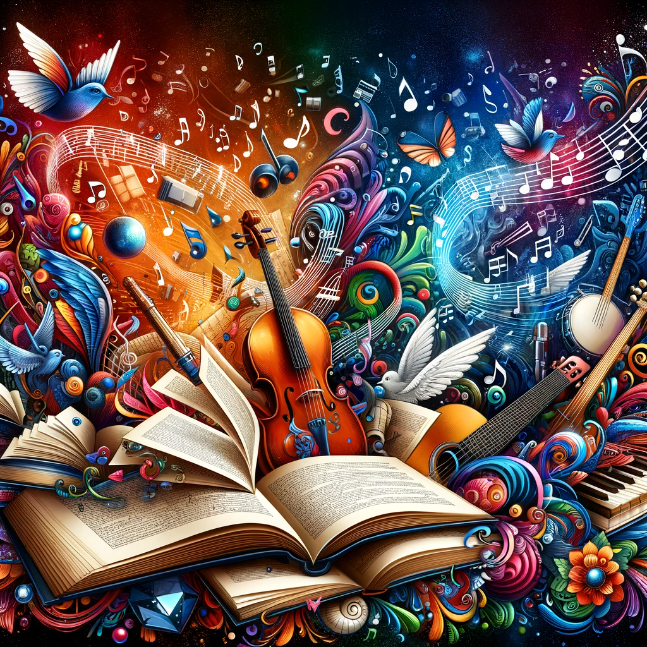Songs and Books: A Symbiotic Relationship

The intertwining of songs and books has a rich history that spans across cultures and centuries. Music and literature, though distinct art forms, often influence each other, creating a symbiotic relationship that enhances the experience of both. For authors and readers alike, understanding this connection can open up new avenues for creativity and appreciation.
The Historical Context
The relationship between songs and books dates back to ancient times when oral traditions dominated. Storytellers would weave tales into songs, ensuring they were easily remembered and passed down through generations. This practice was evident in cultures worldwide, from the epic poems of Homer in Greece to the bardic traditions in Celtic cultures.
Literary References to Music
In modern literature, music often plays a crucial role in setting the tone, developing characters, and advancing the plot. Authors use songs to evoke specific emotions, draw parallels to the narrative, or provide deeper insights into characters’ inner lives. For instance, in Haruki Murakami’s novels, music is more than a backdrop; it is integral to the story, reflecting the characters' moods and themes of the narrative. His novel "Norwegian Wood" is named after The Beatles' song and significantly influences the story's atmosphere.
Songs Inspired by Literature
Numerous songs draw inspiration from books, using literary themes and characters as a foundation. Here are some notable examples:
- Kate Bush – "Wuthering Heights": Inspired by Emily Brontë's classic novel, Kate Bush's 1978 hit captures the haunting and tumultuous love story of Catherine and Heathcliff.
- Led Zeppelin – "Ramble On": This song references J.R.R. Tolkien's "The Lord of the Rings," drawing on the epic journey and mythical elements of the story.
- Iron Maiden – "Rime of the Ancient Mariner": Based on Samuel Taylor Coleridge's poem, this song narrates the mariner's tale and brings the poem's themes to life through heavy metal.
- David Bowie – "1984": Inspired by George Orwell's dystopian novel, Bowie's song reflects the oppressive and totalitarian themes of the book.
- The Police – "Don't Stand So Close to Me": This song references Vladimir Nabokov's controversial novel "Lolita," highlighting the inappropriate relationship between a teacher and a student.
- Taylor Swift – "Wonderland": Drawing inspiration from Lewis Carroll's "Alice's Adventures in Wonderland," Swift's song explores themes of love and confusion in a fantastical setting.
- Regina Spektor – "Samson": This song reimagines the biblical story of Samson and Delilah, offering a modern and emotional twist on the ancient tale.
- Radiohead – "2+2=5": Named after a concept from George Orwell's "1984," this song critiques political manipulation and the distortion of truth.
- Stevie Nicks – "Annabel Lee": Based on Edgar Allan Poe's poem, Nicks' song captures the melancholic and romantic essence of Poe's work.
- Bruce Springsteen – "The Ghost of Tom Joad": Inspired by John Steinbeck's "The Grapes of Wrath," this song reflects on themes of hardship and social justice.
Enhancing the Reading Experience
Pairing music with reading can enhance the experience, creating a multi-sensory immersion into the story. Curated playlists for books, whether created by authors or fans, add a new dimension to storytelling. Listening to music that mirrors the emotions or settings of a book can make the narrative more vivid and engaging. For example, Spotify playlists like "Songs to Read By" offer curated tracks to complement different genres and moods.
Creating Book Playlists
For authors, creating a playlist for their books can be a unique marketing tool. Sharing these playlists on platforms like Spotify or Apple Music allows readers to connect with the story on a deeper level. Authors can include songs that inspired their writing process or tracks that align with the book's themes and settings. Victoria Schwab, author of "The Invisible Life of Addie LaRue," shared a playlist of songs that influenced her writing, providing fans with an immersive experience.
Musical Adaptations of Books
Beyond individual songs, entire musicals and operas have been adapted from literary works. Broadway and West End hits like "Les Misérables" and "The Phantom of the Opera" are prime examples. These adaptations bring stories to life through song, attracting audiences who might not have encountered the books otherwise.
Audiobooks and Music
The rise of audiobooks has also seen an integration of music into storytelling. Background scores in audiobooks enhance the listening experience, setting the tone and amplifying the emotional impact of the narrative. This trend is particularly prevalent in genres like fantasy and thriller, where music helps build atmosphere and tension. Audible's productions often include these musical elements, enhancing the storytelling experience.
The Role of Technology
In the digital age, technology has further intertwined songs and books. Music streaming services and e-book platforms offer features that integrate music with reading. For instance, Amazon’s Kindle devices allow users to listen to music while reading, creating a seamless multimedia experience.
Marketing and Promotion
For book marketers, leveraging the connection between songs and books can be a powerful strategy. Hosting events like book readings with live music performances or creating music videos that tell a story inspired by a book can attract a broader audience. Social media campaigns that highlight the musical elements of a book can also engage fans and encourage sharing. For example, J.K. Rowling's "Harry Potter" series has inspired a variety of music videos and fan-made soundtracks shared across platforms like YouTube.
Conclusion
The relationship between songs and books is a testament to the enduring power of storytelling across different mediums. For readers, writers, and musicians, exploring this connection can lead to a richer appreciation of both art forms. Whether through literary-inspired music, book playlists, or musical adaptations, the symbiosis of songs and books continues to enrich our cultural landscape.
By understanding and leveraging this relationship, authors and marketers can create more engaging and immersive experiences for their audiences. As technology evolves, the potential for innovation in integrating music and literature grows, promising exciting possibilities for the future of storytelling.
References
- Norwegian Wood and Haruki Murakami's Use of Music
- Led Zeppelin's Literary Inspirations
- Iron Maiden and Literature
- Spotify's "Songs to Read By"
- Victoria Schwab's Playlist for "The Invisible Life of Addie LaRue"
- Les Misérables on Broadway
- The Phantom of the Opera on West End
- Audible's Enhanced Audiobook Experience
- Amazon Kindle Music Integration
- Harry Potter Fan-Made Soundtracks
- Kate Bush's "Wuthering Heights"
- David Bowie's "1984"
- The Police's "Don't Stand So Close to Me"
- Taylor Swift's "Wonderland"
- Regina Spektor's "Samson"
- Radiohead's "2+2=5"
- Stevie Nicks' "Annabel Lee"
- Bruce Springsteen's "The Ghost of Tom Joad"



